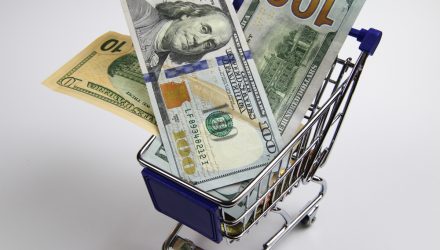Amid rising interest rates, persistently high inflation, and sagging consumer confidence, it’s not surprising that the consumer discretionary sector is enduring some punishment this year.
Likewise, it’s not surprising that some market participants aren’t enthusiastic about consumer cyclical equities and the related exchange traded funds. However, there is some risk in ignoring consumer discretionary stock and ETFs today because some analysts believe discretionary spending is about to shift, and if investors aren’t paying attention, their portfolios may not be appropriately positioned to capitalize on new spending trends.
The Invesco QQQ Trust (QQQ) and the Invesco NASDAQ 100 ETF (QQQM) are examples of ETFs that can help investors capitalize on shifts in consumer tastes. Specifically, some analysts see a move from goods to services-oriented spending materializing.
Following the onset of the coronavirus pandemic, when consumer spending rebounded, it was mostly on goods with services still languishing. More than two years later, there’s a gap between goods and services spending that the latter can fill.
“We forecast that the current deviation in spending on goods and services will converge back to their pre-pandemic trends by mid-2023,” noted Morningstar analyst Dave Sekera. “This equates to a swing of about $450 billion, and this shift could even be larger. Many households may be saturated with goods across several categories in which consumers pulled forward future demand. In addition, consumers may seek to make up for services forgone during the pandemic.”
QQQ and QQQM both track the Nasdaq-100 Index (NDX) so the ETFs’ sector exposures are the same. When it comes to consumer discretionary, the Invesco funds devote 15.24% of their weights to that group, making it the third-largest sector allocation in the ETFs.
“Restaurants, hotels, recreation, and transportation account for about half of the current shortfall from the pre-pandemic trend,” added Sekera. “These areas represent only 20% of total services spending but have been heavily affected by the shift in consumer spending behavior. Restaurant and hotel spending is down 4% compared with trend, yet built-up demand may be much higher than that given discretionary spending on goods remains well above trend. Recreation and transportation have the most ground to cover when it comes to returning to pre-pandemic trends.”
That’s relevant sentiment regarding QQQ and QQQM because the ETFs have exposure to the travel and leisure sub-group thanks to positions in names such as Booking Holdings (NASDAQ: BKNG), Marriott International (NASDAQ: MAR), and Airbnb (NASDAQ: ABNB), among others.
For more news, information, and strategy, visit the ETF Education Channel.
The opinions and forecasts expressed herein are solely those of Tom Lydon, and may not actually come to pass. Information on this site should not be used or construed as an offer to sell, a solicitation of an offer to buy, or a recommendation for any product.








